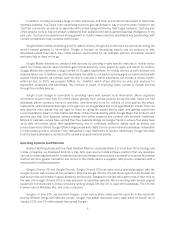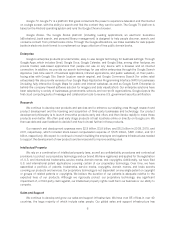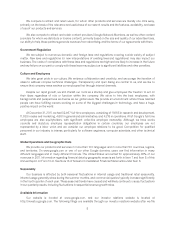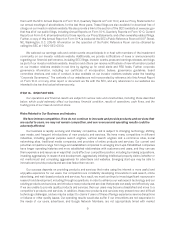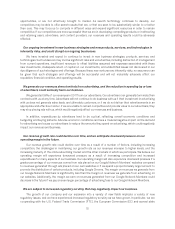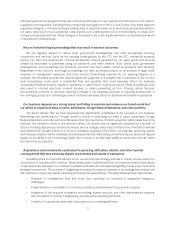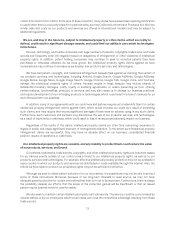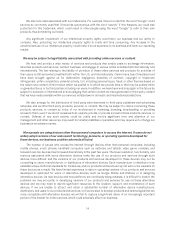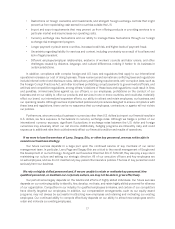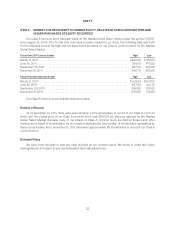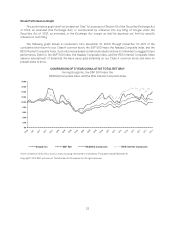Google 2011 Annual Report Download - page 44
Download and view the complete annual report
Please find page 44 of the 2011 Google annual report below. You can navigate through the pages in the report by either clicking on the pages listed below, or by using the keyword search tool below to find specific information within the annual report.Privacy concerns relating to our technology could damage our reputation and deter current and
potential users from using our products and services.
From time to time, concerns have been expressed about whether our products and services compromise the
privacy of users and others. Concerns about our practices with regard to the collection, use, disclosure, or security
of personal information or other privacy related matters, even if unfounded, could damage our reputation and
operating results. While we strive to comply with all applicable data protection laws and regulations, as well as our
own posted privacy policies, any failure or perceived failure to comply may result, and has resulted, in proceedings
or actions against us by government entities or others, or could cause us to lose users and customers, which could
potentially have an adverse effect on our business.
In addition, as nearly all of our products and services are web-based, the amount of data we store for our
users on our servers (including personal information) has been increasing. Any systems failure or compromise of
our security that results in the release of our users’ data could seriously limit the adoption of our products and
services, as well as harm our reputation and brand and, therefore, our business. We expect to continue to expend
significant resources to protect against security breaches. The risk that these types of events could seriously harm
our business is likely to increase as we expand the number of web-based products and services we offer, and
operate in more countries.
Regulatory authorities around the world are considering a number of legislative and regulatory proposals
concerning data protection. In addition, the interpretation and application of consumer and data protection laws in
the U.S., Europe and elsewhere are often uncertain and in flux. It is possible that these laws may be interpreted and
applied in a manner that is inconsistent with our data practices. If so, in addition to the possibility of fines, this could
result in an order requiring that we change our data practices, which could have an adverse effect on our business
and results of operations. Complying with these various laws could cause us to incur substantial costs or require us
to change our business practices in a manner adverse to our business.
If our security measures are breached, or if our services are subject to attacks that degrade or deny
the ability of users to access our products and services, our products and services may be perceived as
not being secure, users and customers may curtail or stop using our products and services, and we may
incur significant legal and financial exposure.
Our products and services involve the storage and transmission of users’ and customers’ proprietary
information, and security breaches could expose us to a risk of loss of this information, litigation, and potential
liability. Our security measures may be breached due to the actions of outside parties, employee error,
malfeasance, or otherwise, and, as a result, an unauthorized party may obtain access to our data or our users’ or
customers’ data. Additionally, outside parties may attempt to fraudulently induce employees, users, or customers
to disclose sensitive information in order to gain access to our data or our users’ or customers’ data. Any such
breach or unauthorized access could result in significant legal and financial exposure, damage to our reputation,
and a loss of confidence in the security of our products and services that could potentially have an adverse effect
on our business. Because the techniques used to obtain unauthorized access, disable or degrade service, or
sabotage systems change frequently and often are not recognized until launched against a target, we may be
unable to anticipate these techniques or to implement adequate preventative measures. If an actual or perceived
breach of our security occurs, the market perception of the effectiveness of our security measures could be
harmed and we could lose users and customers.
Web spam and content farms could decrease our search quality, which could damage our reputation
and deter our current and potential users from using our products and services.
“Web spam” refers to websites that attempt to violate a search engine’s quality guidelines or that otherwise
seek to rank higher in search results than a search engine’s assessment of their relevance and utility would rank
them. Although English-language web spam in our search results has been significantly reduced, and web spam in
15


